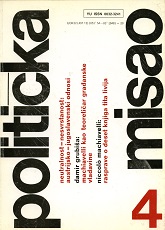Machiavelli kao teoretičar građanske vladavine
Machiavelli as a Theoretician of Bourgeois Government
Author(s): Damir GrubišaSubject(s): Political Philosophy, Political Theory, Political Sciences
Published by: Fakultet političkih znanosti u Zagrebu
Keywords: Machiavelli; Theoretician; Bourgeois Government;
Summary/Abstract: Machiavelli's political theory derives mainly from his two most important works: II principe and the Discorsi. These two books are organically interrelated by the identical type of analysis of prevailing political orders and their classical models. The first part of the paper deals with the methodological basis of Machiavelli's analysis. Political science, whose founder he is, emerges from a direct confrontation with political philosophy. It rejects abstract speculation about the state and the common weal, examining instead the operation of political mechanisms in a concrete social community. In the second part, the author expounds his main thesis about Machiavelli as a theoretician of bourgeois government. This assertion necessitates a critical repudiation of some of the most deeply rooted misconceptions in the interpretation of II principe and of Machiavelli's political theory in general. Machiavelli's 'ideal prince' becomes a "ruler either by the will of the people or by the will of tile nobility", i.e. either directly, by the 'volonte generale’ or indirectly, by the choice of a particular class alliance. He anticipates the concept of constitutional government, which is arrived at, not by force but by institutional consensus. The bourgeois ruler is the ruler of the New Age, he is the personification of the bourgeois mode of production and of its political emanations.
Journal: Politička Misao
- Issue Year: XX/1983
- Issue No: 04
- Page Range: 96-109
- Page Count: 14
- Language: Croatian

